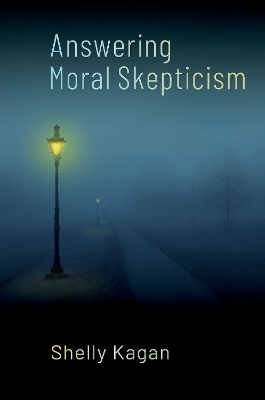
Answering Moral Skepticism
Oxford University Press Inc (Verlag)
978-0-19-768897-7 (ISBN)
Some people are driven by questions like these to the conclusion that we should embrace skepticism about morality, denying the very existence of anything worthy of the name. In Answering Moral Skepticism, Shelly Kagan shows how those who accept the existence of objective moral truth can provide plausible answers to these questions. Focusing throughout on issues that trouble reflective individuals, Kagan provides an accessible defense of the belief in objective morality will be of interest to both students of metaethics as well as anyone worried about the objectivity of their own moral judgements.
Shelly Kagan is the Clark Professor of Philosophy at Yale University. A popular lecturer at Yale, Kagan's lectures on death have been watched online by millions of people around the world, and a book based on the course, Death, has been a national best seller in both S. Korea and Japan. His recent books include How to Count Animals, More or Less (OUP 2019) and The Geometry of Desert (OUP 2012).
Acknowledgments
A Note to the Reader
Introduction
1. What Would Morality Need to Be?
1.1 Job Descriptions
1.2 Possible Elements
1.3 Satisfying the Job Description
2. Basic Positions in Metaethics
2.1 Cognitivism vs. Noncognitivism
2.2 Nihilism vs. Moral Realism
2.3 Varieties of Moral Realism
2.4 Moral Skepticism
3. Nihilism
3.1 The Nature of Nihilism
3.2 The Case for Nihilism
3.3 Disregarding the Arguments
3.4 Normative Nihilism
4. Noncognitivism
4.1 The Nature of Noncognitivism
4.2 The Case for Noncognitivism
4.3 Objections to Noncognitivism
5. Disagreement
5.1 The Argument from Disagreement
5.2 The Implications of Disagreement
5.3 Explaining Moral Disagreement
5.4 Nonconvergence
6. Relativism
6.1 Moral Relativism
6.2 Clarifying Relativism
6.3 Arguing for Relativism
6.4 Relativized Foundational Theories
7. Knowledge
7.1 The Analogy to Observation
7.2 Appearances
7.3 Dismissing Moral Intuitions
7.4 Reliability
7.5 Intuitionism
8. Evolution
8.1 The Argument from Evolution
8.2 A Second Try
8.3 Truth and Advantage in Ethics
8.4 Common Ground
8.5 The Continuity Problem
8.6 Path Dependence
9. Explanation
9.1 A Metaphysical Test
9.2 Explaining Empirical Facts
9.3 Reduction and Explanation
9.4 The Normative Aspect of Moral Facts
9.5 The Unrestricted Test
10. Motivation
10.1 Motive Internalism
10.2 An Argument for Noncognitivism
10.3 Rejecting Motive Internalism
10.4 Rejecting the Humean Theory of Motivation
10.5 The Direction of Fit
11. Reasons
11.1 Reasons Internalism
11.2 Reasons
11.3 Refining the Argument
11.4 Hypothetical Reasons
11.5 Rational Support
11.6 Categorical Reasons and Motivation
12. Reductionism
12.1 The Appeal of Reductionism
12.2 The Nature of Reduction
12.3 The Open Question Argument
12.4 Properties of the Wrong Kind
12.5 The Significance of Reasons for Reduction
12.6 Reducing Reasons
13. Simple Realism
13.1 Simple Normative Realism
13.2 Objections to Irreducible Normativity
13.3 Nonnatural Properties
13.4 The Metaphysics of Morals
14. Moral Realism
14.1 Answering the Moral Skeptic
14.2 Systematic Moral Theory
Notes
References
Index
| Erscheinungsdatum | 02.03.2024 |
|---|---|
| Zusatzinfo | 2 b/w charts |
| Verlagsort | New York |
| Sprache | englisch |
| Maße | 235 x 156 mm |
| Gewicht | 699 g |
| Themenwelt | Geisteswissenschaften ► Philosophie ► Ethik |
| Geisteswissenschaften ► Philosophie ► Metaphysik / Ontologie | |
| ISBN-10 | 0-19-768897-7 / 0197688977 |
| ISBN-13 | 978-0-19-768897-7 / 9780197688977 |
| Zustand | Neuware |
| Informationen gemäß Produktsicherheitsverordnung (GPSR) | |
| Haben Sie eine Frage zum Produkt? |
aus dem Bereich


